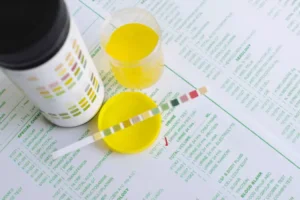
Inpatient rehab is an intensive, residential treatment program that provides patients with 24/7 care and support in a safe and structured environment. We also offer medical detoxification for alcoholism, a critical component of treatment for alcoholism, as the withdrawal symptoms can be severe and potentially life-threatening. Our medical team closely monitors patients during detox and provides medication and other interventions as needed to ensure their comfort and safety.

Mental Health Services
United Recovery Project offers a comprehensive treatment approach to combat alcohol abuse and prevent individuals from developing wet brain. Our multidisciplinary team of medical professionals, nutritionists, and addiction counselors work together to create individualized care plans tailored to each patient’s unique needs. Addressing alcohol use disorder is crucial in the recovery process, as it helps mitigate the risk of developing wet brain and other related conditions.
What Happens When You Take Trazodone and Alcohol Together?
In many ways, a person struggling with alcohol addiction and showing symptoms of second-phase wet brain acts much like someone with Alzheimer’s disease. Early treatment in this stage, typically with thiamine supplements, can alleviate symptoms and mush brain prevent the condition from degenerating into Korsakoff’s psychosis. Although Wernicke’s encephalopathy is generally caused by alcoholism, other potential causes include severe malnutrition, liver disease, hyperthyroidism, and severe anorexia.
Cognitive Impairment Problems with Korsakoff Psychosis

This way you get high-level support from experienced professionals. In relation to Wernicke-Korsakoff or alcohol dementia (as it’s also known), the levels of thiamine need to be addressed. This is because of vomiting, poor nutrition, and the digestive tract becoming inflamed. Alcohol abuse also prevents thiamine from being stored in the liver effectively. A person can have the condition diagnosed where only two or three signs are apparent.
Blood testing can provide key insights into a person’s thiamine levels and other general nutrition. Decreased red blood cell activity could be an indicator of thiamine deficiency. If left untreated, these symptoms can progress into the second, more severe phase of wet brain, known as Korsakoff’s psychosis. Additionally, our addiction counselors provide ongoing support through behavioral therapy, cognitive-behavioral therapy (CBT), and other evidence-based practices. These therapeutic interventions aim to address the psychological aspects of addiction, helping patients develop healthier coping mechanisms and strategies to maintain sobriety.

You might hear the dated term “wet brain” used in reference to Wernicke-Korsakoff syndrome. However, the term “wet brain” carries and perpetuates stigma by inaccurately conveying that people willfully contract it. The truth is two people can have similar drinking patterns and one will develop Wernicke-Korsakoff syndrome and the other won’t.
Initial Symptoms: Wernicke’s Encephalopathy
Ongoing therapy, lifestyle changes, and support systems are crucial for managing the condition and improving the quality of life for those affected. However, the absence of treatment or delayed intervention can lead to severe, irreversible damage, significantly impacting life expectancy and overall well-being. Wet Brain Syndrome, also known as Wernicke-Korsakoff syndrome, is a serious neurological condition primarily caused by a severe deficiency of thiamine (vitamin B1).
In addition to clinical observations, doctors will run lab tests for thiamine deficiency and may order an MRI to look for noticeable changes in the brain. However, MRI tests have a low sensitivity rate of 53%, making them an imperfect diagnostic tool. Alcohol cessation requires a medical detox under supervised care, such as in a specialized rehab center.
- It’s characterised by an impaired ability to learn, amnesia, impairment in both short and long-term memory, and hallucinations.
- Technically anyone can develop wet brain, which occurs when a person is severely deficient in vitamin b1, also known as thiamine.
- If you are concerned about someone with WK syndrome, talk to your primary care physician or a specialist—such as an internist, psychiatrist, addiction psychiatrist, addiction medicine physician, or neurologist.
Take The First Step to a New Life
The leading cause of this deficiency is chronic alcohol misuse, which severely impairs the body’s ability to absorb and utilize thiamine. In addition to alcohol addiction, other factors can contribute to thiamine deficiency and increase the risk of developing Wernicke-Korsakoff syndrome. These include dietary deficiencies, eating disorders, and chemotherapy [2]. Your body can’t produce thiamine on its own—it has to be ingested through your diet. This is typically a non-issue for most healthy adults (think whole grains, asparagus, kale, pork, beef, chicken, eggs and potatoes). Those who struggle with alcohol use disorder, though, are at risk of thiamine deficiency.
- Once you’ve successfully weaned off the alcohol, attention is turned to the psychological aspect of recovery.
- The disorder is a direct result of vitamin B1 (thiamine) deficiency which is seen in people who struggle with poor nutrition and alcohol use disorder.
- It is important to note that thiamine supplementation should continue until the patient is no longer at risk, such as as long as they are consuming alcohol.
- Most patients suffering from wet brain have abused alcohol heavily for many years.
- Eighty-five percent of survivors develop the final stage of wet brain, which is called Korsakoff’s psychosis.
- Treatment for alcohol addiction is best provided through alcohol rehab programmes.
